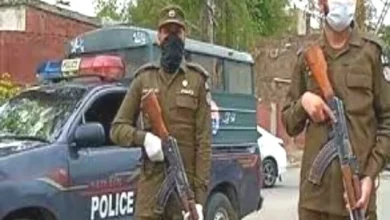30 more Palestinians killed in Israeli airstrikes on Central Gaza

GAZA: At least 30 Palestinians were killed in Israeli strikes in the central Gaza area overnight, a senior UN aid official reported.
The situation in the besieged enclave worsened, with mounting casualties and a critical lack of humanitarian aid for the desperate Palestinian people, a senior UN official reported.
“We’ve seen absolutely horrific images from the scene. There are parents looking for their children, children covered in dust and blood, looking for their parents, multiple injuries on top of the casualties reported, and people still buried under the rubble,” Louise Wateridge, Senior Emergencies Officer with UN Palestine refugee agency UNRWA, speaking to reporters in Geneva and New York from central Gaza.”
The strikes came only one day after the UN General Assembly passed a resolution demanding an immediate, unconditional, and permanent ceasefire in Gaza.
Ms Wateridge described the situation as “absolutely sickening, noting such daily pain and suffering has become the norm for Palestinians living in the Gaza Strip.
Hospitals are overwhelmed, with doctors struggling to treat life-threatening injuries, prevent infections, and address treatable illnesses. The situation is compounded by severe shortages of essentials, including insulin, syringes, and cancer medications.
“Gaza now has the highest number of child amputees per capita anywhere in the world. Children are among the hardest hit, with Gaza now reporting the highest per capita number of child amputees globally,” Ms. Wateridge said.
“Many are losing their limbs. And in scenarios such as this, they’re undergoing surgeries without anaesthesia. I spoke to doctors at Nasser Hospital. This is the largest, semi-functioning, hospital in the Gaza Strip now. And they’re absolutely beside themselves.”
According to UNRWA, nearly 26,000 people have suffered life-changing injuries in the last 14 months – all requiring rehabilitation services,, particularly for amputations and spinal cord injuries, according to the World Health Organization (WHO).
Already in May 2024, more than one in five households in Gaza reported having at least one disabled family member, with 58,000 disabled people identified in the official database of the Palestinian Central Bureau of Statistics.
Despite continued attacks on its premises and staff, “UNRWA here remains one of the largest health actors operating in the Gaza Strip,” Ms. Wateridge explained.
“UNRWA is providing 6.7 million medical consultations during the course of this war,” she said, noting that lab services now are limited to three tests, out of 35 before the conflict erupted in October 2023.
Food insecurity also remains an urgent concern in Gaza. Experts from the UN-partnered Integrated Phase Classification (IPC) Famine Review Committee have already issued an alert over imminent famine in the northern Gaza Strip.
“It’s been 14 months. People here really are surviving on bread, lentils, and food in tin cans. We’re not seeing fruit and vegetables around… In the past four months alone, nearly 19,000 children were hospitalized due to acute malnourishment,” Ms. Wateridge said.
Attacks on an aid convoy on Thursday claimed the lives of several guards, leaving only one truck out of 70 able to deliver food, hygiene supplies and tents to Gaza’s population, after a successful UN inter-agency aid delivery the previous day.
“We went from having a very successful convoy where 105 trucks of food and flour did reach the population, and UNRWA distributed all of these supplies, to the complete opposite situation,” Ms Wateridge said, citing criminal looting and other safety risks that prevented the convoy from reaching its intended destination.
Meanwhile, UNRWA continues to be the backbone of health and humanitarian aid in the Gaza Strip even as its staff risk their lives on a daily basis, it is pointed out.
“We have had colleagues killed. My colleagues have had family members killed,” Ms. Wateridge explained. “The suffering just continues. The sadness continues. It’s very difficult to continue operating under these circumstances for everyone, for all humanitarians.”
Separately, the UN Humanitarian Coordinator for the Occupied Palestinian Territory said he is very concerned about the “rapidly” deteriorating security and humanitarian situation in Gaza, noting that recent multiple strikes have resulted in scores of reported fatalities and numerous injuries.
Muhannad Hadi also expressed concern at the insecurity that has hampered UN aid convoys, two of which were looted on Wednesday.
He said that the principles of distinction, proportionality and precautions in attacks must be respected at all times, while calling on all parties to ensure the protection of civilians and the safe and unimpeded passage of humanitarian aid.
The UN humanitarian affairs office, OCHA, reported that since the intensification of the Israeli military operation in North Gaza governorate two months ago, all UN attempts to reach besieged areas there were either denied or impeded by Israeli authorities.
Since 6 October, the UN and partners have tried to coordinate 137 missions to those parts of the north and 124 were denied outright. The other 13 were approved but then faced impediments along the way.
The UN has submitted 16 requests since this past Monday and almost all were flat-out denied. The only mission given the greenlight was prevented from moving into all the areas it set out to reach.
“OCHA stresses once again that humanitarian movements must be facilitated across Gaza, including to areas in the north, where thousands of Palestinians are facing apocalyptic conditions after almost 10 weeks under siege,” the agency said.
Source link



